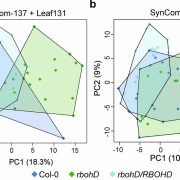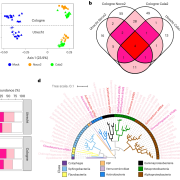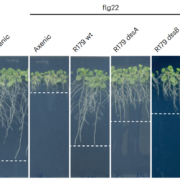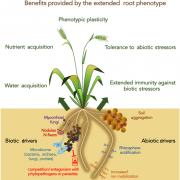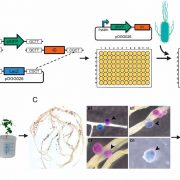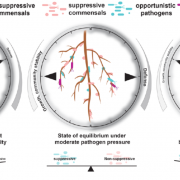Induction of disease suppressive microbiome by non-pathogenic bacterial derivatives
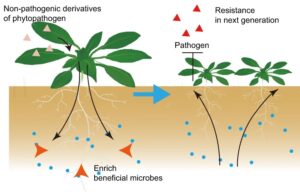 Plants recruit beneficial microbiomes in the rhizosphere in response to aboveground pathogen infections, a mechanism known as “cry for help.” Zhang and Liu et al. investigated this effect to test whether pathogenicity is necessary for assembling a disease-suppressive rhizomicrobiome. By using nonpathogenic derivatives of Pseudomonas syringae (Pst) DC3000 to elicit immune responses in Arabidopsis, the authors identified two derivatives that induce disease suppression similar to the wild-type Pst DC3000. Importantly, these derivatives only triggered pattern-triggered immunity (PTI) and reactive oxygen species (ROS) production without activating effector-triggered immunity (ETI). Analyses of the rhizosphere microbiome infiltrated with these non-pathogenic derivatives identified Devosia as a key enriched taxon. Interestingly, the application of cultured consortia of two Devosia strains reduced the colonization of pathogenic Pst DC3000 and enhanced plant fresh weight. Furthermore, the researchers identified a decrease in the exudation of myristic acid as the key metabolite favoring the enrichment of these specific strains in the rhizosphere. Finally, the authors discovered that secreted metabolites from these non-pathogenic derivatives are sufficient to induce a “cry for help”, which could be blocked by ETI. This study suggests the possibility of identifying non-pathogenic elicitors to repress plant diseases without growth penalties. (Summary by Arijit Mukherjee @ArijitM61745830) Nature Comms. https://doi.org/10.1038/s41467-024-46254-3
Plants recruit beneficial microbiomes in the rhizosphere in response to aboveground pathogen infections, a mechanism known as “cry for help.” Zhang and Liu et al. investigated this effect to test whether pathogenicity is necessary for assembling a disease-suppressive rhizomicrobiome. By using nonpathogenic derivatives of Pseudomonas syringae (Pst) DC3000 to elicit immune responses in Arabidopsis, the authors identified two derivatives that induce disease suppression similar to the wild-type Pst DC3000. Importantly, these derivatives only triggered pattern-triggered immunity (PTI) and reactive oxygen species (ROS) production without activating effector-triggered immunity (ETI). Analyses of the rhizosphere microbiome infiltrated with these non-pathogenic derivatives identified Devosia as a key enriched taxon. Interestingly, the application of cultured consortia of two Devosia strains reduced the colonization of pathogenic Pst DC3000 and enhanced plant fresh weight. Furthermore, the researchers identified a decrease in the exudation of myristic acid as the key metabolite favoring the enrichment of these specific strains in the rhizosphere. Finally, the authors discovered that secreted metabolites from these non-pathogenic derivatives are sufficient to induce a “cry for help”, which could be blocked by ETI. This study suggests the possibility of identifying non-pathogenic elicitors to repress plant diseases without growth penalties. (Summary by Arijit Mukherjee @ArijitM61745830) Nature Comms. https://doi.org/10.1038/s41467-024-46254-3


